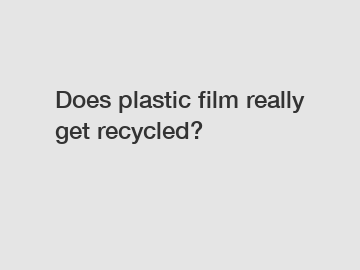Does plastic film really get recycled?
Plastic has become an integral part of our lives, shaping everything from packaging to household items. However, its environmental impact has raised serious concerns, particularly regarding its recyclability. One specific concern is whether plastic film, like grocery bags and product wrappings, truly gets recycled. In this blog post, we will delve into the reality of plastic film recycling, dispel common misconceptions, and shed light on the efforts being made to ensure a sustainable future.
The Plastic Film Recycling Process:
Plastic film recycling is indeed a complex process, but advancements in technology and growing concern for the environment have propelled significant progress in recent years. Contrary to popular belief, plastic film can be and is recyclable. However, its recycling journey differs from that of rigid plastics such as bottles.

The first step is collection. Many stores and supermarkets have dedicated drop-off points where shoppers can return their plastic film. This collected plastic film is then transported to recycling facilities, where it undergoes various stages before being transformed into new products.
Sorting and separation are crucial stages in the recycling process. Advanced machinery is employed to identify and segregate plastic film from other materials, ensuring purity and quality. This is done by utilizing infrared sensors and optical scanners, which effectively distinguish film materials based on their unique properties.
Once sorted, the plastic film is cleaned to remove any contaminants. Cleaning involves washing and drying the plastic film, ensuring that it is ready for the subsequent stages. By eliminating impurities, the resulting recycled plastic film is of higher quality and better suited for reuse.
Then comes the actual recycling stage. Plastic film is shredded into tiny flakes or pellets. These particles can be melted down and used as raw material for manufacturing new plastic film or other plastic products. The process varies depending on the type of plastic film being recycled, but it often involves extrusion or injection molding techniques. Through these methods, recycled plastic film can serve as the foundation for a range of products, such as new packaging materials, fencing, or even composite lumber.
Challenges and Innovations in Plastic Film Recycling:
Despite the viability of plastic film recycling, challenges still exist. One major hurdle is consumer awareness. Many people remain uninformed about proper plastic film disposal, leading to it ending up in landfills or contaminating recycling streams. Education initiatives and increased accessibility to drop-off locations can help address this issue.
Additionally, not all plastic film is created equal. Different types of film possess distinct characteristics, making some more challenging to recycle than others. Thin films, such as wrappers, are more difficult to process due to their lightweight nature and tendency to get entangled in sorting machinery. In response, innovative technologies and engineering advancements are being developed to overcome these obstacles and enhance the efficiency of plastic film recycling.
The Importance of Consumer Participation:
Increasing the rate of plastic film recycling also relies heavily on consumer participation. Apart from depositing plastic film at designated collection points, consumers can make conscious choices while shopping. Opting for reusable bags or reducing plastic film consumption altogether contributes significantly to waste reduction and promotes a circular economy approach.
Conclusion:
In conclusion, plastic film recycling is a viable and important aspect of environmental sustainability. It offers an effective solution to address the environmental impact of plastic waste. With advancements in technology and growing awareness, the recycling of plastic film is becoming increasingly accessible and efficient. However, the success of these efforts relies on informed consumer participation and continued innovation in the recycling industry.
By debunking misconceptions surrounding plastic film recycling, we can all contribute to the creation of a more sustainable future. Together, let us make conscious choices and actively participate in reducing plastic film waste, ensuring a cleaner and greener world for generations to come.
If you are looking for more details, kindly visit dewatering machine exporter, plastic granulator, washing plastic machine.
216
0
0

Comments
All Comments (0)